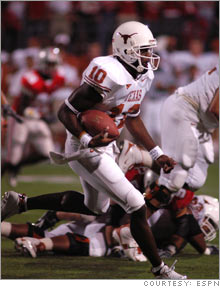College sports' fuzzy mathBig college sports programs are making a greater push to increase revenue, but schools are having to kick in more money than ever.NEW YORK (CNNMoney.com) -- You don't need an 800 score on your math SAT to know that college sports is big business. But just how big a business might still surprise you. The National Collegiate Athletics Association estimates that all college sports teams generated $4.2 billion from its fans and various partners, such as broadcasters and sponsors.
To put that in context, that's a billion more than what the National Basketball Association generated globally in the 2004-2005 season, according to the most recent estimate from Forbes. Granted, there are far more teams and games in college sports than the NBA. But no one ever tried to portray the NBA as a not-for-profit amateur enterprise. And that's just the point of Congress starting to question whether college sports still deserves the not-for-profit status it enjoys, along with tax advantages for the programs and alums who shower college sports with millions in contributions. On November 13, the NCAA will be sending the House Ways and Means Committee a response to the pointed eight-page letter sent to it last month by Bill Thomas, R-California, the outgoing chairman of the Congress's chief tax-writing panel. "Corporate sponsorships, multimillion dollar television deals, highly paid coaches with no academic duties and the dedication of inordinate amounts of time by athletes to training lead many to believe that major college football and men's basketball more closely resemble professional sports than amateur sports," Thomas wrote in his letter. "Why should the federal government subsidize the athletic activities of educational institutions when that subsidy is being used to help pay for escalating coaches' salaries, costly chartered travel and state of the art athletic facilities?" he continued. The threat to college programs from Thomas' questioning would be small, even if he wasn't preparing to leave Congress. Few would probably be eager to push for the removal of college sports' lucrative tax status. And plenty of members of Congress likely would defend the tax break for individuals in order to keep college sports enthusiasts in their districts happy. But Thomas' question is a good one, especially since the NCAA has admitted that it is trying to increase revenue from athletics as fast as it can. "Athletics, like the university as a whole, seeks to maximize revenues. In this respect, it has an obligation to conduct its revenue-generating activities in a productive and sound business-like manner. Anything less would be incompetence at best and malfeasance at worst," said NCAA President Myles Brand in January. That's the reason the current college football season will see an extra game, and for the major college programs, an extra 100,000 tickets being sold. It's the reason that college basketball is squeezing in extra games as well. It's the reason that conferences like the Big Ten is starting its own cable network. But even with those efforts to grab more revenue, the pace of revenue growth has begun to slow. Dan Fulks, an accounting professor for Translyvania University who is working as a consultant for the NCAA in its response to Ways & Means, said preliminary figures show that ticket sales and other revenue generated directly by Division 1-A football and basketball programs grew only 6 percent between 2003 and 2005, compraed with 18.5 percent growth between 2001 and 2003. Brand acknowledged in a speech at the National Press Club last week that partly due to slowing growth of ticket sales and other revenue, college sports is causing a greater financial drain on school budgets. "As outside revenue growth for athletics begins to moderate at most institutions, the rate of budget growth has not always followed," he said. "In many instances, the result has been a need for increased support of athletics through institutional funds." But Brand said the NCAA would face anti-trust problems if it tried to mandate spending limits on programs. "And even if it were possible, universities and their boards would not be willing to have the NCAA dictate their expenditures; and they would be correct in doing so," he said. "Budgetary decisions properly belong at the campus level." So with Congress and the NCAA both unlikely and/or unwilling to put any kind of serious curbs on spending, the arms race in college sports is likely to continue. And the $3.6 billion a year that schools are estimated to be pouring into athletics to cover losses, even at many Division 1-A schools, is only going to grow, even as millions upon millions of dollars more are generated through ticket sales and television deals. It's a equation that doesn't make any sense, no matter what your math SAT scores. Nothing but net: Profits at slam dunk for big-time college basketball |
| |||||||||||||||



